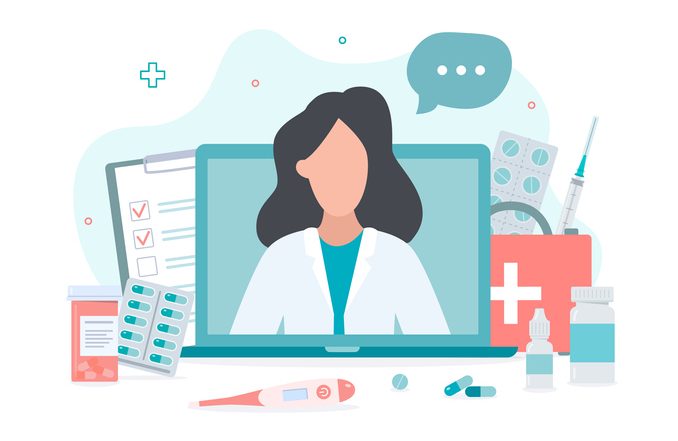Study on accuracy of Dr. Google
https://www.onlinelibrary.wiley.com/doi/full/10.5694/mja2.50600
The internet, specifically search engines (Google and others) can be a great source of medical information, but it is not set up to input symptoms and output an accurate diagnosis. Maybe someday, but not yet and we are not anywhere close, which is supported by the numbers in the article and many others. Here is the dirty truth for most providers: we use the internet too. The difference between a layperson looking to self diagnose and a trained provider using to enhance diagnosis or treatment is immense. Like most things, the right tools in the right hands are powerful, in the wrong hands, they can be dangerous.
–Andrew Kalnow, DO
I like the fact that Google is so inaccurate. Now that ER volumes are way down I want every patient with a sniffle or a lump to Google their symptoms and see that “OMG it could be cancer” and come running to the ER. That way we can accurately diagnose what they really have.
–Mark Plaster, MD, JD
Would like to have reviewed the scenarios presented in the studies or seen performance of physicians versus the computers. One program recommended “self care” for liver failure and non-urgent care for a stroke. Several of the online symptom checkers didn’t suggest “self care” for any scenario (regardless of how minor) and 40% of non‐urgent and self‐care scenarios were advised to seek urgent or emergency care. You want an argument for the value of medical providers? This is it.
– William Sullivan, DO, JD
Many patients are now using online symptom checkers to help in facilitating a self-diagnosis and to assist them with triage. Dr. Internet only provided the correct diagnosis in 36% of cases and 52% as a top three result. The correct triage advice was only provided in 49% of patients (This was better in triage advice for emergency care at 63%). Most of these platforms are set up to be risk averse and often recommend more emergent care than appropriate. Almost every patient I talk to says the diagnosis of cancer was listed and scared them enough to come to the ED. I have always said my number one referral base comes from Dr. Internet.
—– Salim R. Rezaie, MD
At ~$5,000 per course, Gilead will still make billions from remdesivir sales.
We shouldn’t be surprised to be having this conversation. I do find it a little suspect that Remdesivir got all the praise and other, older cheaper potential therapies have been lambasted — at least in part — because of who supported them (i.e. not the pharmaceutical companies).
–– E. Paul DeKoning, MD, MS, FACEP, FAAEM
Wow! The operative phrase here is: The drug, which thwarts an enzyme the virus relies on to replicate, did not reduce the rate of mortality by a statistically significant extent in the trial.
–Mark Plaster, MD, JD
Let’s be honest here…this drug has not been shown to decrease mortality…it is the new, more expensive version of Tamiflu for COVID-19…It can potentially reduce symptoms by a few days if given early enough with the added potential side effect of kidney injury.
—– Salim R. Rezaie, MD
ER visits down 42% since COVID
https://www.cdc.gov/mmwr/volumes/69/wr/mm6923e1.htm#T1_down
Ours have in many ways come back. I never thought I’d live to see the day where I was glad that patients and families were calling from the waiting room to complain that they hadn’t been seen yet. I can’t say yet whether they’re sicker; not sure how exactly we would know for sure. What I do know is that caring for [all of]them is harder. Not medically but logistically. Everything. Takes. More. Time. We may also never know the impact lower volumes has had on trainees of all sorts and sizes. On the upside, I think there’s been an incredible emphasis on critically-ill patients, resuscitation, and pathophysiology. That has to count for something.
–– E. Paul DeKoning, MD, MS, FACEP, FAAEM
I was worried about the long-term medical and psychological impacts of COVID-19 back in April. The message, “stay home for us,” was taken too literally. We are now seeing delayed presentations of MI, stroke, burst appendicitis and now psychiatric illness. COVID-19 didn’t magically cure other illnesses, people are scared to come to the ED. The impact of a lockdown and our public messaging only amplifies a broken system’s inability to care for the underserved. This is what I like to call the COVID-19 collateral damage.
—– Salim R. Rezaie, MD
Initially, I was surprised that the number of visits decreased as much as they did. Interesting that the top 20 complaints exhibiting decrease in visits were for various pain complaints (abdominal pain, headaches, musculoskeletal pain), respiratory complaints and minor injuries. I can see minor injuries going down since most people were confined to home. Why the others? Bigger question is whether, with the bump in ED volumes, the companies that cut salaries during the lean times will provide bonuses during the busy times.
– William Sullivan, DO, JD
We are going to see the patients who didn’t come in over the last several months. But they are going to be sicker with later stage problems.
–Mark Plaster, MD, JD









